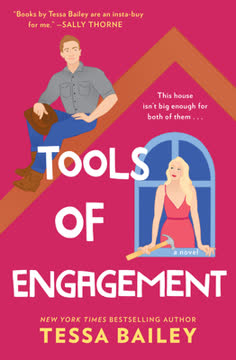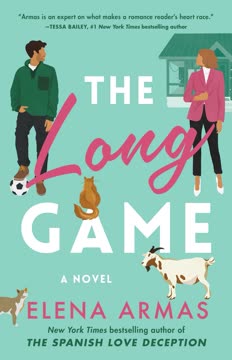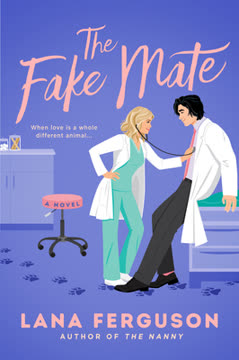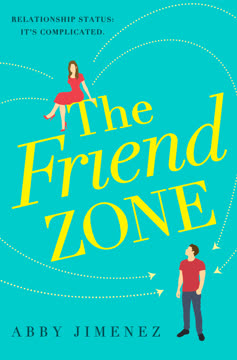Plot Summary
Cowboy in Suburbia
Wes Daniels, a young rodeo cowboy, finds himself in Long Island, suddenly responsible for his five-year-old niece, Laura, after his sister leaves town. Out of his element, Wes juggles early mornings, school schedules, and the chaos of single parenthood. He's a fish out of water, but his dry humor and stubborn resilience keep him afloat. Meanwhile, he's drawn to Bethany Castle, the local perfectionist and house stager, whose color-coded schedules and flawless appearance both fascinate and frustrate him. Their lives are about to collide in ways neither expects, as Wes's temporary stay in suburbia becomes the start of something much bigger.
Perfectionist on the Edge
Bethany Castle is the queen of order, her life a carefully curated display of beauty and competence. But beneath the surface, anxiety and self-doubt simmer. She's restless, tired of being relegated to the sidelines in her family's house-flipping business. When her brother starts a new project across the street, Bethany's competitive streak is triggered. She's determined to prove herself by flipping a house on her own, but the fear of imperfection and public failure gnaws at her. Her carefully constructed world is about to be tested by chaos, risk, and a certain infuriating cowboy.
Zellweger Moment
When Bethany finally announces her solo flip, she's met with skepticism from her family and the community. In a surprising twist, Wes publicly quits her brother's crew to join her, echoing the iconic "Jerry Maguire" moment. Their partnership is fraught with tension, banter, and undeniable chemistry. Both are out of their comfort zones—Bethany with construction, Wes with responsibility—but together, they form an unlikely team. The stakes are high, and the emotional risk even higher, as they begin to rely on each other in ways neither anticipated.
Doomsday Flip Begins
The house Bethany chooses is a disaster—rotting floors, rats, and a collapsing roof. She's overwhelmed, but Wes's steady presence and practical skills help her take the first steps. Their dynamic is a push-pull of control and chaos, with Bethany's perfectionism clashing against Wes's laid-back approach. As they recruit a ragtag crew of retirees and misfits, the project becomes a test of patience, trust, and vulnerability. The house is a metaphor for their own messy, unfinished selves, and every swing of the sledgehammer brings them closer to confronting their fears.
Tea Parties and Tension
Amidst the dust and demolition, Wes and Bethany's relationship deepens. Wes struggles with feelings of inadequacy as a guardian, while Bethany faces her own insecurities about intimacy and being "enough." A spontaneous tea party for Laura and her friends becomes a turning point, revealing Bethany's hidden warmth and Wes's longing for connection. Their banter softens into genuine care, and the boundaries between work and personal life blur. Each learns to let go—Bethany of her need for control, Wes of his fear of abandonment.
Rivalry and Reality TV
A chance encounter with a TV producer turns Bethany and her brother's competing flips into a reality show, "Flip Off." The pressure mounts as cameras capture every mistake and triumph. The competition exposes old wounds and new vulnerabilities, forcing Bethany to confront her family's expectations and her own self-worth. Wes, meanwhile, becomes her anchor, even as his own future in Port Jefferson grows uncertain. The stakes are no longer just about winning a contest—they're about proving to themselves and each other that they can build something lasting.
Wedding Confessions
At her sister's wedding, Bethany is surrounded by examples of messy, imperfect love. The celebration is both joyful and bittersweet, highlighting her own loneliness and desire for connection. A stolen dance with Wes behind the house becomes a confession booth, where they admit their fears and needs. The wedding acts as a catalyst, pushing them closer together—and closer to the edge of their own emotional cliffs.
Sledgehammers and Secrets
As demolition progresses, so do the cracks in Bethany and Wes's emotional armor. Bethany's anxiety peaks during her first swing of the sledgehammer, but Wes's encouragement helps her push through. Their partnership is tested by setbacks, miscommunications, and the ever-present cameras. Secrets are revealed—about Wes's past in foster care, Bethany's history of failed relationships, and their mutual fear of not being "enough." Each breakthrough in the house mirrors a breakthrough in their hearts.
Pink Pants and Progress
The flip moves forward, with moments of levity and flirtation—like Wes's obsession with Bethany's pink yoga pants. Their banter becomes foreplay, and their trust deepens. Wes's role as Laura's guardian is threatened by his sister's absence, while Bethany grapples with her own family's doubts. Together, they navigate the challenges of construction, childcare, and reality TV, finding joy in small victories and comfort in each other's presence.
Guardianship and Guilt
Wes's sister returns, forcing him to confront his own fears of abandonment and responsibility. The possibility of losing Laura—and his newfound sense of belonging—looms large. Bethany, meanwhile, is forced to reckon with her own capacity for love and commitment. Their relationship is tested by external pressures and internal doubts, as they struggle to define what "family" means to them.
Staging a New Life
As the flip nears completion, Bethany faces her greatest challenge: letting go of her need for control and embracing the messiness of real life. With the help of her friends and the Just Us League, she learns to ask for help and accept imperfection. Wes, too, learns to trust in the possibility of stability and love. Together, they stage not just a house, but a new life—one built on honesty, vulnerability, and mutual support.
Cracks in the Foundation
A failed home inspection jeopardizes Wes's guardianship of Laura and shakes Bethany's confidence to the core. Old patterns of self-sabotage resurface, and both retreat into their fears. Their relationship teeters on the brink, as they question whether they're truly capable of building a future together. The house, once a symbol of hope, now feels like a monument to their failures.
The Art of Messy Love
In the aftermath of heartbreak, Bethany and Wes are forced to confront their deepest insecurities. With the support of friends and family, they realize that love isn't about perfection—it's about showing up, even when it's hard. They apologize, forgive, and choose each other, not in spite of their flaws, but because of them. Their reunion is both cathartic and joyful, a testament to the power of messy, honest love.
Setbacks and Second Chances
Wes files an appeal for guardianship, and Bethany gathers her friends to help finish the house. They both learn the value of asking for help and accepting support. Their second chance is hard-won, built on a foundation of mutual respect and vulnerability. The final days of the flip are a whirlwind of activity, but this time, they face the chaos together.
The Final Reveal
The reality show finale brings the community together for the big reveal. Bethany and Wes's house is declared the winner, but the real victory is personal. In front of friends, family, and cameras, they confess their love and commitment to each other. The house, once a symbol of anxiety and competition, becomes a home—a place where they can build a future together.
Home Is a Feeling
With the flip behind them, Bethany and Wes settle into their new life as a blended family. They navigate the challenges of cohabitation, parenthood, and ongoing self-doubt, but their love endures. The house is no longer just a project—it's a living, breathing testament to their journey. Together, they learn that home isn't a place or a prize, but a feeling they create for each other every day.
Everything, Together
Months later, Bethany and Wes celebrate Laura's kindergarten graduation surrounded by friends and family. Their home is messy, noisy, and full of love. They've learned to embrace imperfection, support each other through setbacks, and find joy in the chaos. Their story is a celebration of second chances, chosen family, and the art of building a life—together.
Characters
Bethany Castle
Bethany is a high-achieving, image-conscious house stager who craves control and validation. Her life is a carefully curated display of competence, but beneath the surface, she's plagued by anxiety and self-doubt. Her relationships have been marked by emotional distance and fear of vulnerability, leading to a pattern of pushing people away before they can reject her. Bethany's journey is one of learning to let go—of perfection, of control, and of the belief that she's unlovable if she's not flawless. Through her partnership with Wes, she discovers the strength in asking for help, the beauty in imperfection, and the courage to love and be loved, messy and all.
Wes Daniels
Wes is a young, charming Texan with a rough-and-tumble past, thrust into the role of guardian for his niece, Laura. Haunted by a childhood in foster care and a deep-seated fear of abandonment, Wes is both fiercely independent and secretly longing for connection. His easygoing exterior masks a profound sense of responsibility and a desire to prove himself worthy of love and stability. Wes's relationship with Bethany challenges him to confront his own insecurities, trust in the possibility of permanence, and redefine what it means to be a family. His growth is marked by vulnerability, steadfastness, and a willingness to fight for the people he loves.
Laura
Laura is Wes's five-year-old niece, left in his care when her mother disappears. Her presence forces both Wes and Bethany to confront their fears and step into new roles. Laura's struggles with loneliness and adjustment mirror the adults' own insecurities, and her simple needs—love, stability, acceptance—become the heart of the story. Through tea parties, playdates, and moments of vulnerability, Laura becomes the glue that binds Wes and Bethany together, teaching them the true meaning of family.
Stephen Castle
Stephen is Bethany's older brother and the head of the family's house-flipping business. He's both a source of support and a symbol of the limitations placed on Bethany. Their sibling rivalry is both playful and painful, rooted in family dynamics and unspoken expectations. Stephen's own journey—balancing ambition, family, and vulnerability—parallels Bethany's, and their eventual reconciliation is a testament to the power of honesty and mutual respect.
The Just Us League (Georgie, Rosie, et al.)
The Just Us League is a women's support group founded by Bethany, providing a safe space for honesty, encouragement, and growth. Georgie (Bethany's sister) and Rosie (her best friend) are central figures, offering comic relief, tough love, and unwavering support. The group's evolution mirrors Bethany's own, shifting from a façade of perfection to a celebration of authenticity and mutual aid. Their presence underscores the importance of chosen family and the healing power of friendship.
Becky (Wes's sister)
Becky's decision to leave Laura with Wes sets the story in motion. Her struggles with addiction, instability, and guilt are a shadow over Wes's newfound sense of family. Becky's eventual return and journey toward recovery highlight themes of forgiveness, second chances, and the complexities of parenthood. Her relationship with Wes is fraught but ultimately redemptive, as both siblings learn to accept help and offer grace.
Slade Hogan
Slade is the charismatic, slightly ridiculous host of the "Flip Off" reality show. His presence adds levity and external pressure, forcing the characters to perform for an audience and confront their own narratives. Slade's outsider perspective highlights the absurdity of perfectionism and the performative aspects of modern life.
Carl and Ollie
Carl and Ollie are older, semi-retired tradesmen who join Bethany and Wes's crew. Their banter, wisdom, and quirks provide comic relief and a sense of community. They represent the value of experience, the importance of teamwork, and the joy of finding purpose at any age.
Paula (Home Inspector)
Paula is the court-appointed home inspector whose decision threatens Wes's guardianship of Laura. Her judgment—deeming the home "cold"—serves as a catalyst for crisis and self-reflection, forcing Bethany and Wes to confront their deepest fears and insecurities.
Kristin Castle
Kristin is Stephen's wife, known for her flair for drama and penchant for cryptic notes. Her antics provide both comic relief and moments of genuine insight into the complexities of family, marriage, and communication.
Plot Devices
House Flipping as Emotional Metaphor
The central plot device is the house flip, which serves as a powerful metaphor for the characters' internal journeys. Every stage of renovation—demolition, rebuilding, staging—parallels the process of breaking down emotional walls, confronting fears, and constructing new identities. The messiness of construction reflects the messiness of real life and love, challenging the characters to embrace imperfection and growth.
Enemies-to-Lovers and Forced Proximity
The classic enemies-to-lovers trope is heightened by forced proximity: Wes and Bethany must work together, live together, and co-parent Laura. Their banter, rivalry, and mutual annoyance create sparks that gradually ignite into genuine affection and passion. The reality show competition amplifies the stakes, forcing them to perform and confront their true feelings under public scrutiny.
Reality TV and Public Performance
The "Flip Off" reality show introduces a layer of performativity, making private struggles public and intensifying the pressure to succeed. The cameras act as both a source of anxiety and a catalyst for honesty, pushing the characters to drop their masks and reveal their authentic selves.
Guardianship and Found Family
Wes's quest for guardianship of Laura raises the stakes, intertwining legal, emotional, and practical challenges. The threat of losing Laura—and the possibility of building a new family—forces both Wes and Bethany to confront their pasts, redefine their priorities, and fight for what matters most.
Symbolic Objects and Recurring Motifs
Items like Bethany's pink pants, Wes's cowboy hat, and Laura's tea set recur throughout the story, symbolizing vulnerability, comfort, and the blending of worlds. The recurring motif of "messiness"—in houses, relationships, and emotions—serves as a reminder that true beauty lies in imperfection.
Narrative Structure and Foreshadowing
The story is structured around parallel arcs: Bethany's journey from perfectionism to authenticity, Wes's from rootlessness to belonging, and Laura's from loneliness to security. Foreshadowing is used to hint at future crises and resolutions, building tension and emotional payoff.
Analysis
Tools of Engagement is a contemporary romance that uses the high-stakes world of house flipping as a lens for exploring deeper themes of perfectionism, vulnerability, and the messy, beautiful work of building a life. Tessa Bailey crafts a narrative where the physical act of renovation becomes a metaphor for emotional growth: walls are torn down, foundations are tested, and new spaces are created for love and belonging. The novel interrogates the myth of perfection—both in homes and in people—showing that true connection is forged not in flawless surfaces, but in the willingness to be seen, to ask for help, and to embrace imperfection. Through the dynamic interplay of banter, rivalry, and genuine care, Bethany and Wes's relationship models the courage required to choose each other, again and again, even when it's hard. The story celebrates found family, the power of community, and the radical act of letting go—of control, of fear, and of the belief that we must be perfect to be loved. In a world obsessed with appearances and achievement, Tools of Engagement offers a refreshing, heartfelt reminder: home is not a place, but a feeling we create together, one messy, honest day at a time.
Last updated:
Review Summary
Tools of Engagement received mixed reviews, with an average rating of 3.73 out of 5. Readers enjoyed the enemies-to-lovers romance, age gap, and chemistry between Bethany and Wes. Many praised the character development, steamy scenes, and witty banter. Some found Bethany's insecurities relatable, while others found them frustrating. The reality TV plot was divisive, with some enjoying it and others finding it unnecessary. Overall, fans of the series appreciated the conclusion, while new readers struggled with the lack of context from previous books.

















